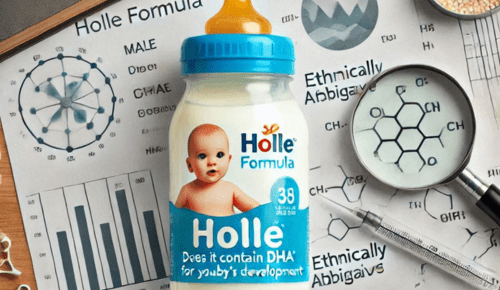
DHA, or docosahexaenoic acid, is an omega-3 fatty acid that is essential for the development of the brain and eyes in infants. It is a key component of the cell membranes in the brain and retina, and plays a crucial role in cognitive and visual function. DHA is naturally found in breast milk, and is often added to infant formula to ensure that formula-fed babies receive the same benefits as those who are breastfed. DHA is also important for adults, as it has been linked to improved heart health, reduced inflammation, and better cognitive function.
DHA is commonly sourced from fish oil, algae oil, or other marine sources. It is important to note that not all infant formulas contain DHA, so it is important for parents to carefully read the labels and choose a formula that includes this essential fatty acid. The inclusion of DHA in infant formula has been the subject of extensive research, and has been shown to have a positive impact on the development of infants. It is recommended that infants receive a minimum of 0.2% of total fatty acids as DHA in their diet to support healthy growth and development.
Importance of DHA in infant formula
The inclusion of DHA in infant formula is crucial for the healthy development of babies. DHA plays a key role in the development of the brain and eyes, and has been shown to have a positive impact on cognitive function and visual acuity in infants. Research has also suggested that DHA may have a role in reducing the risk of certain developmental disorders, such as attention deficit hyperactivity disorder (ADHD) and autism spectrum disorders.
In addition to its role in brain and eye development, DHA has also been linked to improved immune function and reduced risk of allergies in infants. This is particularly important for formula-fed babies, as breast milk naturally contains DHA, while many infant formulas do not. Therefore, it is essential for parents to choose a formula that includes DHA to ensure that their baby receives the necessary nutrients for healthy growth and development.
Holle formula ingredients
Holle formula is a popular choice for parents who are looking for an organic and natural alternative to traditional infant formulas. The ingredients in Holle formula are carefully selected to provide babies with the essential nutrients they need for healthy growth and development. Holle formula is made with high-quality organic ingredients, including organic skimmed milk, organic whey powder, organic vegetable oils, and essential vitamins and minerals.
Holle formula is free from artificial preservatives, colors, and flavors, and is made with ingredients that are sourced from biodynamic farms. This means that the ingredients are grown and produced in harmony with nature, without the use of synthetic pesticides or fertilizers. The result is a formula that is not only nutritious, but also gentle on the environment.
Does Holle formula contain DHA?
Holle formula does not contain added DHA, as the brand believes in providing babies with the most natural and unprocessed ingredients possible. While DHA is an important nutrient for infant development, Holle formula focuses on providing a balanced and natural diet for babies without the need for added synthetic nutrients. Instead, Holle formula includes a blend of organic vegetable oils, such as palm oil, rapeseed oil, sunflower oil, and coconut oil, which provide essential fatty acids for healthy growth and development.
While some parents may prefer a formula that includes added DHA, others may appreciate Holle’s commitment to using only natural and organic ingredients. It is important for parents to carefully consider their baby’s individual needs and consult with a healthcare professional before choosing an infant formula.
Benefits of DHA in infant formula
The inclusion of DHA in infant formula has been shown to have numerous benefits for babies. DHA plays a crucial role in the development of the brain and eyes, and has been linked to improved cognitive function and visual acuity in infants. Research has also suggested that DHA may have a role in reducing the risk of certain developmental disorders, such as ADHD and autism spectrum disorders.
In addition to its role in brain and eye development, DHA has also been linked to improved immune function and reduced risk of allergies in infants. This is particularly important for formula-fed babies, as breast milk naturally contains DHA, while many infant formulas do not. Therefore, it is essential for parents to choose a formula that includes DHA to ensure that their baby receives the necessary nutrients for healthy growth and development.
Alternatives to DHA in infant formula
For parents who are looking for an alternative to DHA-fortified infant formula, there are several options available. Some parents may choose to supplement their baby’s diet with a separate DHA supplement, such as fish oil or algae oil. These supplements can be added to breast milk or formula to ensure that babies receive the necessary amount of DHA for healthy development.
Another alternative is to choose an infant formula that includes other sources of omega-3 fatty acids, such as alpha-linolenic acid (ALA) from flaxseed oil or chia seed oil. While ALA is not as potent as DHA, it can be converted into DHA in the body, providing a natural source of this essential nutrient.
It is important for parents to carefully consider their baby’s individual needs and consult with a healthcare professional before choosing an infant formula or supplement.
Choosing the right formula for your baby
Choosing the right infant formula for your baby is an important decision that should be made with careful consideration of your baby’s individual needs. While DHA-fortified formulas offer numerous benefits for brain and eye development, some parents may prefer a more natural and unprocessed option, such as Holle formula.
Ultimately, the most important thing is to provide your baby with a balanced diet that includes all the essential nutrients they need for healthy growth and development. Whether you choose a formula with added DHA or opt for a more natural alternative, it is important to consult with a healthcare professional to ensure that your baby’s nutritional needs are being met. By carefully considering your options and seeking professional guidance, you can make an informed decision that will support your baby’s health and well-being.




